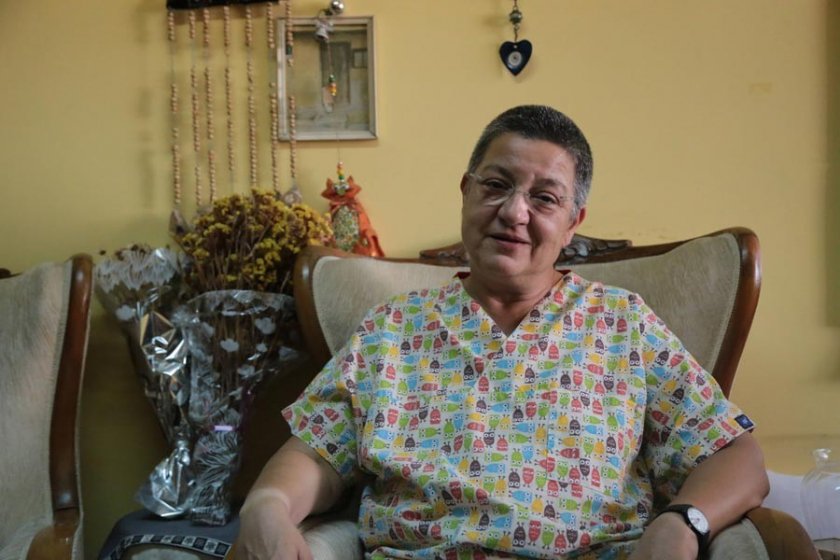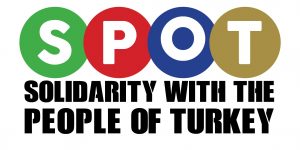We are publishing the text submitted to the court by Evrensel columnist Prof. Dr Şebnem Korur Fincancı, who was sentenced to 30 months’ imprisonment.
We are publishing the text submitted to the court by Evrensel columnist, academic & chair of Human Rights Foundation of Turkey, Prof. Dr Şebnem Korur Fincancı, who was sentenced to thirty months’ imprisonment. Prof. Dr Şebnem Korur Fincancı was charged for “terrorist organisation propaganda” for having signed the “We will not be party to this crime” declaration.
To İstanbul Serious Crime Court No 37,
I have given great thought to what I will say here today. I have done so because I was mindful of the humility with which I received the Albert Osswald Foundation’s Hessian Peace Prize just three weeks ago at the recommendation of academics from Leipzig University’s Institute for Peace and Conflict Resolution for the efforts I have made in the fight for human rights to which I have devoted my life and in documenting torture. Your colleagues listened to Gülten Akın’s poem “Awaiting the War” from beloved Aslı Takanay, and, inspired by her, I, too, ended my speech at the prize ceremony with the same poem. I do not propose to read the poem again but there is merit in repeating its concluding words once more. Let me indulge myself by once again refreshing everyone’s memory: “A human is a responsibility!” So, I had in fact on 4 October 2018 in my statement to explain to your honours what crime we were not party to summarized the Cizre preliminary investigation report which you imagine yourselves to have found by googling me and you endeavour to portray as a crime component, and I had tried to convey through the photographs at which you have expressed your discomfort several times with references to the “corpse photographs,” including the photograph of the children’s bones I found in the course of investigations, what was going on in that period.
Those images that discomforted you so are part of my work, but also part of your work. This is how it should be! This is a Serious Crime Court and, hence, the presentation I made on 4 October should have been of the nature of a criminal complaint about you. I was thus able to feel joy on seeing the report and my interviews published in newspapers that you appended to the file at the last moment and following the recommendation on the merits. However, in place of the sense of humility engendered by the prize awarded to me for doing my job and hunting down the truth as both a doctor and forensic medicine expert, I am unfortunately filled with shame as I confront the effort on this occasion to criminalize the truth and our fight for human rights.
Bertold Brecht says:
“Justice is the bread of the people
Sometimes is plentiful, sometimes it is scarce
Sometimes it tastes good, sometimes it tastes bad.
When the bread is scarce, there is hunger.
When the bread is bad, there is discontent.
Throw away the bad justice
Baked without love, kneaded without knowledge!
Justice without flavour, with a grey crust
The stale justice which comes too late!”
and I am only capable of replying with Brecht when confronted with the endeavour to criminalize a scientific fact that should be treated as a criminal complaint and regarding which nobody has come forward and proved to the contrary that there were no children there, and thus our defence evidence.
The Universal Declaration of Human Rights celebrated its seventieth-anniversary last week. Noted in the preamble to the declaration is: “Whereas it is essential, if man is not to be compelled to have recourse, as a last resort, to rebellion against tyranny and oppression, that human rights should be protected by the rule of law.” With it stated in Article 10 of the same declaration, “Everyone is entitled in full equality to a fair and public hearing by an independent and impartial tribunal, in the determination of his rights and obligations and of any criminal charge against him,” it is said in turn in Article 11, “Everyone charged with a penal offence has the right to be presumed innocent until proved guilty according to law in a public trial at which he has had all the guarantees necessary for his defence. No one shall be held guilty of any penal offence on account of any act or omission which did not constitute a penal offence, under national or international law, at the time when it was committed. Nor shall a heavier penalty be imposed than the one that was applicable at the time the penal offence was committed.” The penalizing of the demand for peace and the documenting of human rights violations, which do not constitute penal offences under international law, in courts that I do not consider to be independent and impartial demonstrates to all of us here that the requirement to protect human rights by the rule of law is being treated with contempt.
My dear friend Eren Keskin, who addressed the Human Rights Panorama event that we staged as the Human Rights Association and Human Rights Foundation of Turkey said in his speech, quoting from Edward Said, “Intellectuals do not resolve crisis, they create crisis” Well, how does an intellectual create crisis? Of course, by asking questions and persistently pursuing the truth. Even if the answers will not be to anyone’s liking, they do not refrain from asking.
Personally, I make no claims to intellectualism. Let there be no misunderstanding. As a whole, what I have been referring to with every word uttered in Çağlayan over the course of a year is an extraordinary corpus that once more equates to the description by Edward Said, “Yes, an intellectual’s voice is lonely, but it has resonance only because it associates itself freely with the reality of a movement, the aspirations of a people, the common pursuit of a shared ideal.” This corpus has accumulated over the past year in trials brought under “copy and paste” indictments against 542 academics for wanting peace as, just as in what today is the 1009th hearing, they have continued to question evidence the courts have not researched, pursue the truth and pose discomforting questions. It is clear that we are referring to a whole that quite rightly creates crisis.
“The dreams of a child are peace” says Yannis Ritsos at the start of his poem “Peace.” It is a long poem. I will thus restrict myself to a few lines:
“Peace is the odour of food at evening
When an automobile stopping in the street does not mean fear
When a knock on the door means a friend
And the opening of a window every hour means sky
Feasting our eyes with the distant bells of its colours,
this is peace…
Peace is the clenched fist of men
it is warm bread on the world’s table”
I once more thank all my friends together with whom I have stood with fastened hands on our passage over a year. Wanting peace is not a crime. I do not accept your charges. (EVRENSEL DAILY)

